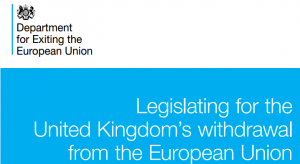By Rose Slowe LLM, Honorary Research Fellow, University of Bristol Law School. Author on EU Law and Barrister at Foundry Chambers.
 Leaving the EU without a deal on 29 March 2019 is not the “legal default”, as has been repeatedly, but wrongly, asserted. It would, in fact, be in violation of the supreme law at both the domestic and supranational level, namely the UK constitution and EU Treaties (or more broadly, the General Principles of Community Law which includes ECJ jurisprudence alongside the Treaties). As such, without an Act of Parliament authorising Brexit in whatever form, the legal default is that the Article 50 notice issued will lapse, if not unilaterally revoked.
Leaving the EU without a deal on 29 March 2019 is not the “legal default”, as has been repeatedly, but wrongly, asserted. It would, in fact, be in violation of the supreme law at both the domestic and supranational level, namely the UK constitution and EU Treaties (or more broadly, the General Principles of Community Law which includes ECJ jurisprudence alongside the Treaties). As such, without an Act of Parliament authorising Brexit in whatever form, the legal default is that the Article 50 notice issued will lapse, if not unilaterally revoked.
Article 50(1) of the Treaty on European Union (‘TEU’) provides that a Member State may decide to withdraw from the EU in accordance with ‘its own constitutional requirements’. The Supreme Court, the highest judicial authority responsible for interpreting our unwritten constitution, confirmed in R (on the application of Miller and another) v Secretary of State for Exiting the European Union [2017] UKSC 5, that, as a matter of UK constitutional law, only an Act of Parliament can authorise, and give effect to, changes in domestic law and existing legal rights. The Miller litigation, while lacking in a critical respect, as discussed elsewhere, was an essential source of legal certainty in terms of our constitutional requirements and, specifically, the doctrine of parliamentary sovereignty as it pertains to Brexit; judicial clarification at the highest level of legal authority. Of significance, the majority held that the European Communities Act 1972 has rendered EU law a source of domestic law and, now that it has acquired that status, removing it, wholly or in part, is a matter on which Parliament has to legislate. (more…)





